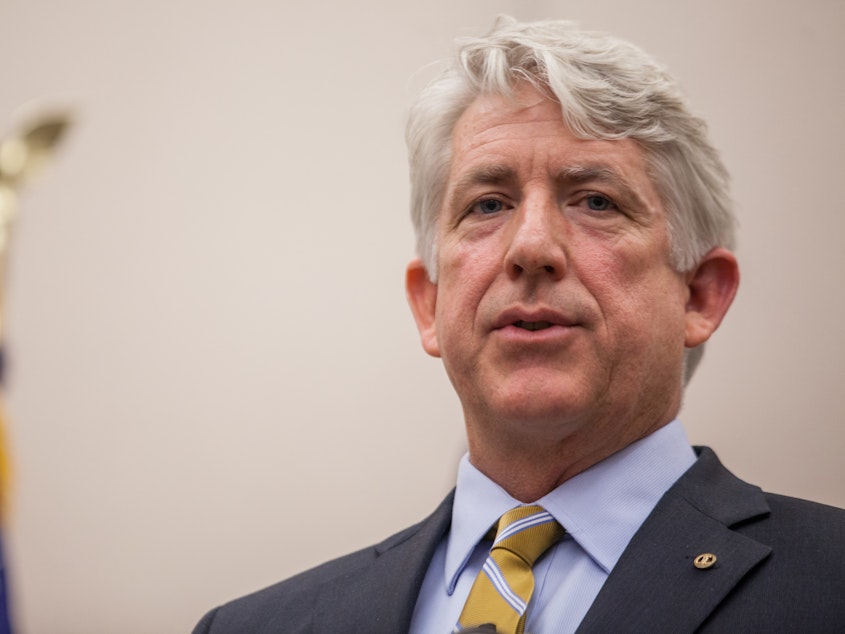Virginia AG Says He Dressed As A Rapper And Wore 'Brown Makeup' At A 1980 Party

With Virginia's top two politicians mired in their own controversies, the state's attorney general, Mark Herring, has revealed a racial incident in his own past. In a statement released Wednesday, he said he and friends attended a party in 1980 dressed as rappers they admired, including wearing wigs and "brown makeup."
"In 1980, when I was a 19-year-old undergraduate in college, some friends suggested we attend a party dressed like rappers we listened to at the time, like Kurtis Blow, and perform a song," he wrote. "It sounds ridiculous even now writing it. But because of our ignorance and glib attitudes – and because we did not have an appreciation for the experiences and perspectives of others – we dressed up and put on wigs and brown makeup."
Herring also said he's "sure we all have done things at one time or another in our lives that show poor judgment, and worse yet, have caused some level of pain to others." The 1980 party, he said, is a "glaring example" of that.
The statement comes after a racist photo on Gov. Ralph Northam's 1984 medical school yearbook page surfaced last week. The photo shows one person in blackface and another wearing a Ku Klux Klan robe. After apologizing for the photo, Northam later insisted he was not one of the people in it. Lt. Gov. Justin Fairfax is facing an allegation of sexual assault, which he has denied.
Herring is a progressive Democrat whose life and career reflect Virginia's evolution from capital of the Confederacy to the only Southern state President Trump did not win in 2016.
"This was a onetime occurrence and I accept full responsibility for my conduct," Herring said.
The 57-year-old Virginia native comes from Loudoun County, a once largely rural area that now counts as one of Washington, D.C.'s outer suburbs. Herring began his political career there on the Board of Supervisors, followed by eight years in the Virginia Senate.
Read the full statement below:
"The very bright light that is shining on Virginia right now is sparking a painful but, I think we all hope, important conversation. The stakes are high, and our spirits are low.
"I am sure we all have done things at one time or another in our lives that show poor judgment, and worse yet, have caused some level of pain to others. I have a glaring example from my past that I have thought about with deep regret in the many years since, and certainly each time I took a step forward in public service, realizing that my goals and this memory could someday collide and cause pain for people I care about, those who stood with me in the many years since, or those who I hoped to serve while in office.
"In 1980, when I was a 19-year-old undergraduate in college, some friends suggested we attend a party dressed like rappers we listened to at the time, like Kurtis Blow, and perform a song. It sounds ridiculous even now writing it. But because of our ignorance and glib attitudes – and because we did not have an appreciation for the experiences and perspectives of others – we dressed up and put on wigs and brown makeup.
"This was a onetime occurrence and I accept full responsibility for my conduct.
That conduct clearly shows that, as a young man, I had a callous and inexcusable lack of awareness and insensitivity to the pain my behavior could inflict on others. It was really a minimization of both people of color, and a minimization of a horrific history I knew well even then.
"Although the shame of that moment has haunted me for decades, and though my disclosure of it now pains me immensely, what I am feeling in no way compares to the betrayal, the shock, and the deep pain that Virginians of color may be feeling. Where they have deserved to feel heard, respected, understood, and honestly represented, I fear my actions have contributed to them being forced to revisit and feel a historical pain that has never been allowed to become history.
"This conduct is in no way reflective of the man I have become in the nearly 40 years since.
"As a senator and as attorney general, I have felt an obligation to not just acknowledge but work affirmatively to address the racial inequities and systemic racism that we know exist in our criminal justice system, in our election processes, and in other institutions of power. I have long supported efforts to empower communities of color by fighting for access to healthcare, making it easier and simpler to vote, and twice defended the historic re-enfranchisement of former felons before the Supreme Court of Virginia. I have launched efforts to make our criminal justice system more just, fair, and equal by addressing implicit bias in law enforcement, establishing Virginia's first-ever program to improve re-entry programs in local jails, and pushing efforts to reform the use of cash bail. And I have tried to combat the rise in hate crimes and white supremacist violence that is plaguing our Commonwealth and our country.
"That I have contributed to the pain Virginians have felt this week is the greatest shame I have ever felt. Forgiveness in instances like these is a complicated process, one that necessarily cannot and should not be decided by anyone but those directly affected by the transgressor, should forgiveness be possible or appropriate at all. In the days ahead, honest conversations and discussions will make it clear whether I can or should continue to serve as attorney general, but no matter where we go from here, I will say that from the bottom of my heart, I am deeply, deeply sorry for the pain that I cause with this revelation."
Mark Katkov contributed to this report. [Copyright 2019 NPR]

